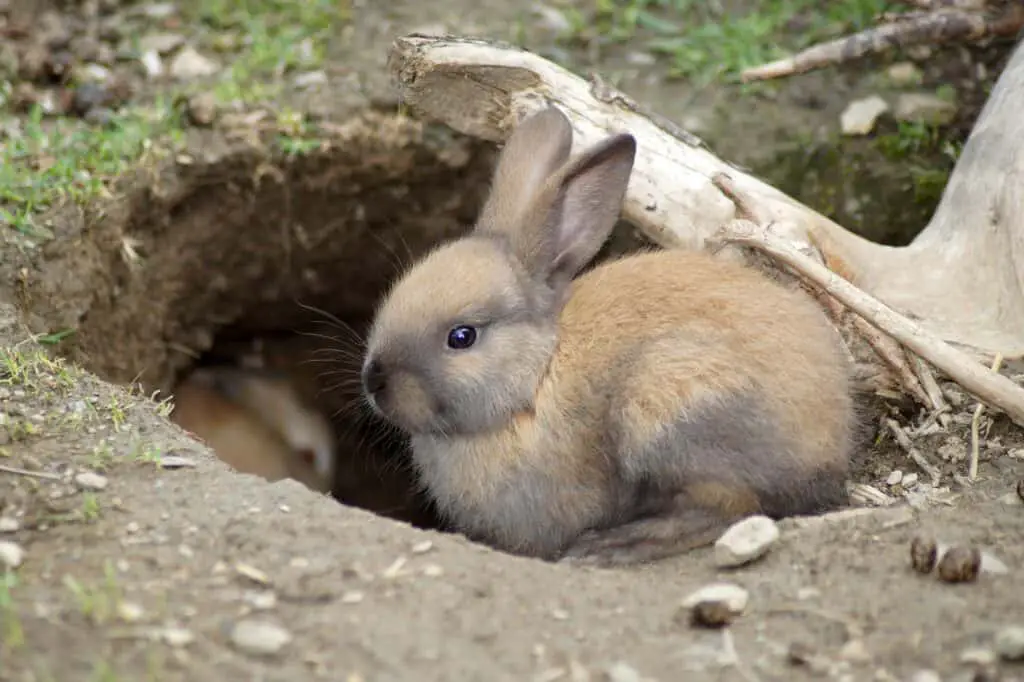
Rabbits groom themselves daily like any other mammal, wild or domestic, and one of the most common things they need to maintain is their nails. Considering these little furballs are notorious nibblers with constantly growing nails, they need some way to keep them short and, in the wild, sharp. But do rabbits bite their own nails?
Rabbits do not usually bite their own nails. Rabbits are avid diggers and most commonly wear down their nails by digging burrows to create warrens. While domestic rabbits have been known to bite their nails while grooming, nail-biting is often a sign of insufficient grooming, stress, or an inadequate diet.
When a rabbit does bite its nails, it’s usually a red flag to owners that something is distressing your rabbit. Keep reading to discover more about why rabbits might bite their nails.
Why Do Rabbit’s Bite Their Nails?
First, before we delve into the “whys” of a rabbit biting its nails, I’d like to clearly state that nail-biting is not a natural behavior in rabbits, so it is never something your rabbit should do.
If you notice a domestic or wild rabbit seems to be taking too much interest in their nails, then there be some good reasons behind it.
Most of these reasons apply to domestic rabbits since this is where the behavior most commonly manifests, but in rare instances, nail-bitting can occur in wild rabbits as well.
Domestic and wild rabbits most often bite their nails as a result of:
1. Insufficient Grooming
When you own a pet rabbit, everything about that animal’s care falls to you. You become their main source of food, toys, affection, health, and, of course, grooming.
Apart from brushing your rabbit’s fur, nail clipping is one of the most important and regular elements of the grooming routine and should generally be done every month.
Because a rabbit’s nails grow continuously throughout its life, they can become extremely long if not worn down routinely. Therefore, if your rabbit feels that his nails are too long, he might take to grooming himself and try biting off his own nails.
A rabbit will usually resort to nail-biting when its nail length begins to impede mobility or cause pain. The best way to avoid nail-biting in a rabbit is to give opportunities to dig, or by cutting their nails safely by sniping them with a nail trimmer regularly.
2. Something Is Lacking in The Rabbit’s Diet
Many animals will resort to odd and frankly gross behaviors when their body senses they are not obtaining certain nutrients from their regular diet. Dogs eating their own feces is a common example of this.
Sometimes, rabbits will join in on this odd behavior and start to bite their nails, especially if they feel something is lacking in their diet.
Whether or not rabbits are actually obtaining what they lack in their diet by biting and consuming their nails is unlikely, However, it might be a good idea to check what you are feeding your pet rabbit and see if there are any obvious nutritional needs you can to fill.
Most rabbits thrive on diverse diets filled with hay, fresh veggies and fruits, and small amounts of pellets.
3. Stress Fueled Self-Mutilation
As a pet owner, you never want to see your beloved rabbits harm themselves in any way, but sometimes this is the quickest way for the animal to convey to you that something isn’t right.
In the case of rabbits, some rabbits may bite themselves and rip out fur as z form of self-mutilation, in addition to biting and potentially ripping off their own nails.
If your rabbit is clearly demonstrating signs of self-mutilation, this indicates that they may be stressed, frustrated, or even bored. When rabbits aren’t emotionally or mentally content, they will often find ways to express their feelings, and unfortunately, nail-biting is one way to do this.
4. Environment is Devoid of A Digging Outlet
Rabbits are natural diggers that enjoy creating burrows and warrens in the wild, filled with vast tunnels systems that can reach several feet underground.
Since most domestic rabbits are kept in some form of caged enclosure, they rarely have an outlet for this intense digging instinct.
As a result, many rabbits bite their nails out of frustration since they aren’t using the nails for their natural intended use.
Is It Bad for a Rabbit to Have Long Nails?
It is not good for rabbits to have long nails. Overgrown nails in rabbits can result in loss of mobility, arthritis, and even dislocation if not properly trimmed. While clipping methods vary, a rabbit’s nails should be cut slightly above the quick once each month to prevent injury or other health concerns.
While there are no pain receptors in your rabbit’s nails apart from the quick, this isn’t a reason to be lax about keeping them short.
As a result, some rabbits will change the way they move, stressing or disfiguring other body parts and resulting in health problems such as arthritis. Long nails can also limit overall mobility, which, in turn, could result in a rabbit becoming obese from lack of exercise, a health consequence that quickly manifests other health issues.
Additionally, long nails in rabbits increase the possibility of nails getting snagged on objects in the rabbit’s enclosure and potentially ripping off entirely. This could cause your rabbit’s toe to dislocate and may even lead to other health risks, such as infection.
How Can Owners Help Trim Their Rabbits Nails?
The easiest way to help keep your rabbit’s nails nice and short is to trim them yourself using a classic nail clipper made specifically for these animals.
Clipping a rabbit’s nails is similar to clipping a dog’s or other common domestic animals. Rabbits have 18 nails altogether, and the goal is to clip them slightly above the end of the quick so you don’t cut this sensitive portion of the nail.
Your rabbit will most likely not enjoy the nail clipping process, so it is important to be patient and not overly stress them for this grooming routine.
If you’re new to rabbit nail clipping and don’t know where the vein or quick is in their nails, start small and cut off small pieces of the nail at a time until you’re more confident in the process.
How to Keep a Rabbit’s Nails Short Without Cutting Them
Nail clippers are an exceptional tool for preventing your rabbit’s nails from growing to excessive lengths, but some pet owners prefer easier or more natural alternatives if available. Luckily, there are several ways you can keep your rabbit’s nails short without cutting.
Rabbit owners can keep a rabbit’s nails trimmed without cutting by:
1. Using a Nail File
This might seem like cheating, but it is more than an acceptable alternative to nail clippers for owners who are new to these common tools or just uncomfortable using them altogether.
Nail files are great for shortening your rabbit’s nails enough to ensure they can’t catch on to other objects and can be used in-between visits with vets or professional groomers you might go to for nail clippings.
2. Buying Your Rabbit a Scratchpad
In addition to shelters and toys, another common feature in rabbit enclosures is scratchpads or scratching posts. These are usually wooden objects your rabbits can scratch up to naturally wear down their nails to a more comfortable length.
Some alternative options include paper bags and pieces of cardboard, although they are less durable and will therefore need to be replaced more frequently.
3. Giving Your Rabbit Digging Opportunities
As we mentioned previously, rabbits are natural diggers, and frequently, digging is the fastest way to wear down their nails without requiring a nail clipper.
While some owners make their rabbits digging units out of plant containers, soil, and wood shavings; a more preferable alternative, if possible, is supervised time outdoors.
If you don’t mind your rabbit digging a hole or two in your lawn, you could easily set up a penned area outside and allow your rabbit to dig to their heart’s content as long as they don’t burrow too deep.
Final Thoughts
Rabbits are exceptional pets that require significant care, particularly when it comes to clipping their nails. If you notice your rabbit is biting it’s nails, consider the common causes listed above to determine which might be the source of this unnatural behavior.
In the event you have troubleshot all of the causes mentioned here and find that your rabbit still bites their nails, you should consult a qualified veterinarian. Although nail-biting might be a quirky pet behavior, it can have unfortunate side effects on your rabbit’s quality of life and should be addressed to ensure they are content and healthy.
